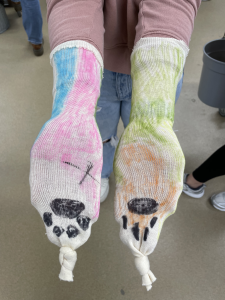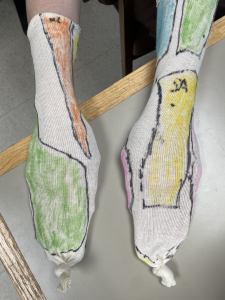

Methods and Materials
2 Inch stockinette is cut into 24 inch lengths and tied at one end. Canine fore and hind limb models are covered with Glad Press’n Seal® to protect them from staining. The stockinette is applied over the limbs. A marker is used to outline the regions of autonomous zone innervation. Additional markers are used to color in the outlined areas to match the key. Paw pads are included in the drawings to orient students after removal from the model limb. Students are encouraged to keep the socks for future study.
Active Learning Exercise Information
Forelimb and Hindlimb Innervation- Autonomous Zones and Reflexes
Don’t let anyone rob you of your imagination, your creativity, or your curiosity. It’s your place in the world; it’s your life. Go on and do all you can with it, and make it the life you want to live.
Mae Jemison (engineer, physician, astronaut)


